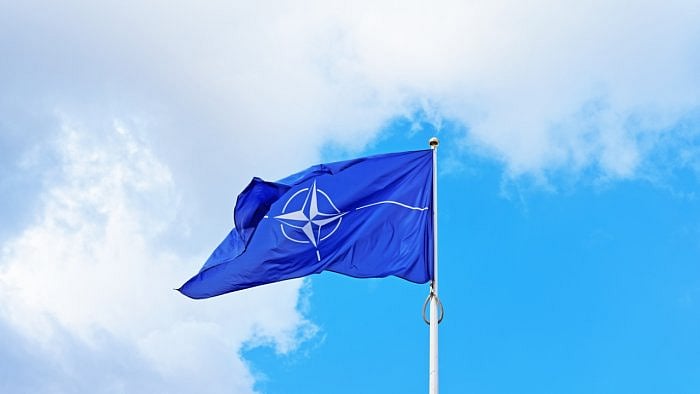
NATO flag.
Credit: iStock Photo
Arthur Conolly, a British Intelligence Officer with the 6th Bengal Light Infantry in the service of the East India Company, coined the term ‘Great Game’ to conceptualise the power struggle between the British and Russian empire during the 19th century. As the British fear of Russia’s southward expansion which threatened British India and Russian fear of British expansion into central Asia drew a conclusion with the signing of the Anglo-Russian Convention of 1907 relating to Persia, Afghanistan and Tibet, a new branch of national science called geo-politics emerged towards the fag end of the 19th century in Germany, a time when the international system was re-ordering itself given the simultaneous rise of Japan, the United States, Germany and Italy.
As developed by Friedrich Ratzel (1844-1904) – a professor of Geography in Germany and the country’s leading political scientist – geopolitics, was based on the concept of Lebensraum (living space) devised in 1860 by the biologist Oscar Peschel in a review of Darwin’s The Origin of Species (1859). Within this approach, the geographical reality and its relationship with political behaviour was linked to the very survival of the nation-state.
Under similar re-ordering conditions of the 21st century, a new geographical reality is emerging at the north pole – The Arctic. This region is now identified as an important zone in a potential future superpower conflict. As satellite-based sensors observe Summer Arctic Sea ice extent is shrinking by 12.2% per decade due to warmer temperatures, this region is not only strategic from an economic, rare-earth minerals, and maritime-trade route perspective, but also a war-fighting perspective.
According to a study published in Nature on January 8, the Arctic Ocean could see its first ice-free day before the end of the decade. The US Department of Defence Arctic Strategy (2024) calls for a new strategic approach as the region is becoming a venue for strategic competition amid a new geopolitical climate. In addition to the Ukraine crisis, the accession of Sweden and Finland to NATO and accelerating impacts of climate change, the increasing collaboration between China and Russia in the Arctic is inducing strategic instability. The Arctic has now moved into the focus of the US, Russian, and Chinese strategic considerations – the three great powers within the international system.
War and aftermath
Militarisation of the Arctic is closely linked with Russia’s Special Military Operations in Ukraine which began with Russia securing its southern flank at Crimea in the Black Sea in 2014. With Sweden and Finland joining the Atlantic alliance following the Ukraine War, the non-Russian Arctic is now a NATO territory – an undesired outcome for Russia – with seven out of the eight Arctic nations now NATO members. Russia responded by deploying ships armed with tactical nuclear weapons in the Baltic Sea for the first time in 30 years. The military consequence of the war in Ukraine was the refocus of its military power on the Arctic and Nordic region by Russia and the US-led NATO.
After Russia’s invasion of Crimea and its annexation by the use of force in 2014, Russia approved and released its maritime doctrine in 2015 and replaced it with a new maritime doctrine in July 2022 amidst its Special Military Operations against Ukraine since February 2022. The objective of Russia’s ongoing military campaign is to reconfigure Ukraine’s territory into a “land-locked” country with no access to the Sea of Azov and the Black Sea. Free access for the Russian fleet to the Atlantic and the Pacific oceans is one of the cornerstones of Russia’s strategic priorities in the Arctic. Black Sea is important, but the Arctic is vital for Russia in order to realise its vision – development and strengthening of the Russian Federation as a great maritime power. From China’s geo-political and military perspective, controlling the Arctic allows one to obtain the “three continents and two oceans’ geographical advantage” over the Northern Hemisphere.
With China christening itself as a near-Arctic state, the US seeks to exercise its forces to build readiness for operations at high latitudes. Along with the seabed, outer-cyber space and the Antarctic, the Arctic region constitutes the ungoverned or under-governed ‘new strategic frontiers’ ripe for a great power rivalry. More than the military threat posed by extension of the geopolitical living space in the Arctic, great powers will need to cooperate to mitigate the consequence of missing ice cover which will trap more heat as well as increase global warming.
(The writer lectures at Sichuan International Studies University, Chongqing, China)